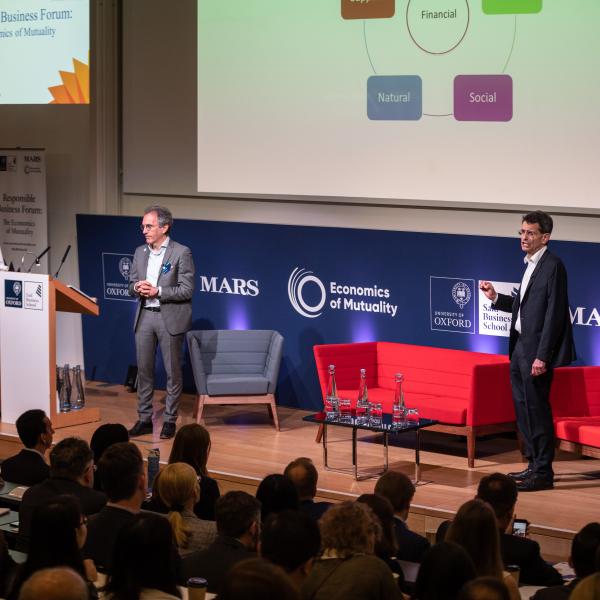About the event
The third annual Responsible Business Forum, The Economics of Mutuality, brought together a wide range of stakeholders.
Welcoming students, faculty, thought leaders, businesses, institutional investors, policymakers, and NGOs from around the world, the Forum brought us together to share our experiences of addressing challenges in our ecosystems to generate financial, social, and environmental value at scale. Creating this value for stakeholders is at the core of what we term ‘mutuality.’
Today, there is both a duty and an opportunity for business leaders to reflect the changing needs of society and the environment, restoring trust in business. The purpose of this Forum is to pursue ways in which business both stays true to its nature, which is to deliver performance, while also delivering positive benefits for all stakeholders and addressing the loss of trust incorporations.
Since 2016, the University of Oxford’s Saïd Business School and Mars Catalyst have organised the Responsible Business Forum as part of their joint Mutuality in Business research programme. The programme explores the concept of mutuality in business and develops a business management theory for The Economics of Mutuality, teaching curricula, new management practices, and business case studies.
The Forum brings together C-suite executives, leading academics, foundation leaders, NGOs, investors, government officials, and MBA students to share and explore innovative ways to transform business performance and practice for the common good. Past contributors have argued that responsible business practices that benefit individuals, communities, and the environment, while sharing financial capital, are at the core of how business must operate in the 21st century.
This year, we built upon the success of the previous two years, focusing on two key areas: the need to change the business practices of today to increase trust and reduce negative impact, and, looking forward, the new challenges and opportunities that are being brought by the fourth industrial revolution.
Over the two days, the Forum explored these topics through keynote speeches, panel discussion, case study presentations and masterclasses. The first day began with an introductory session and a series of masterclasses exploring key aspects of The Economics of Mutuality. In the afternoon of the first day and the morning of the second day, the Forum examined a series of cases that describe specific examples of the ways in which companies have adopted mutual approaches to business. These companies satisfy two criteria: they expound explicit purposes or values that reflect objectives beyond pure financial performance, and they demonstrate a serious commitment to implementing them through their ownership, governance, leadership, measurement, and management practices.
In addition to the cases and masterclasses, there were panels and keynotes on mutuality and presentations by MBA students; the Forum closed with a student-led Oxford Union style debate on mutuality.
